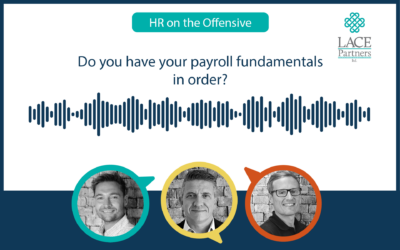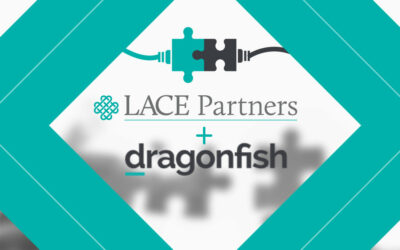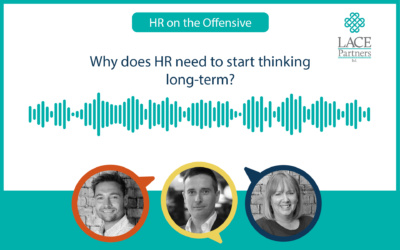Welcome everyone to 2020 and on behalf of the whole team at LACE Partners we wish you a happy new year. At LACE, we work hard trying to keep on top of all of the latest developments in the HR discipline, from the latest start-up tech companies that are providing tools to improve the efficiency of HR (which culminates for us in our people_tech event later in the year), through to what HR teams are doing to drive value for their businesses (you can also read our whitepaper HR on the Offensive which touches on this as one of its six themes).
With the celebrations of Christmas and the New Year now over, we thought we’d take some time to review what the emerging HR trends might be. We asked some of our Exec Team what they see as the ‘things to look out for’.
What do you think will be the big trends that HR leaders need to look out for in 2020?
Emma Leonis
Rise of the ‘People Consultant’
As we explored in HR On the Offensive, it’s time for HR to rip up the traditional operating model rule book. We believe HR could become two separate functions with distinct services offerings – one being the strategist and architect of solutions (‘People Consultant’) and the second delivering operational HR services. An effective People Consultant will proactively problem solve, identify trends and embrace data, bring solutions to their business and confidently lead their stakeholders through change. These senior HRD level individuals will most likely be embedded (and paid for) within the business – and there will, therefore, be a lot fewer of them than traditional ‘HR Business Partners’ and ‘Centres of Expertise’. Such a change requires a fundamental mindset shift within both HR and the business. The question isn’t whether we are ready for it, it’s whether we can afford not to make the change and, most importantly, whether we can make that change stick.
Focus on the ‘human’
For the past decade, organisations have been looking to streamline and automate as much administrative and transactional activity as possible and optimise the use of self service. Whilst this has efficiency and cost benefits, this relentless drive to digitise has, in places, gone too far. At the end of the day, we must not lose sight of the need ‘be human’. Whether that’s through the channels we offer our colleagues when they need help, the way an HR advisor speaks to them or the customised experience we offer them based on their role and personal preferences. In my view, no amount of automation or AI will ever replace the need to speak to an expert or someone who will just listen to you in your time of need.
The holy grail of the integrated employee experience platform
Service delivery technology is a rapidly evolving marketplace and there are countless platforms which offer employees the ability to find the information they want with the ability to integrate into core HRIS platforms. The ultimate goal is a one-stop landing page with seamless cross platform integration. The challenge now is for HR to work in partnership with all functions to design this integrated employee experience and for the technology marketplace to provide a multi-platform solution.
Cathy Acratopulo
Get more value out of investment in HR technology
Most larger organisations have now invested significantly in their HR systems, often moving to a SaaS solution. We’ve seen in 2019 that there is now an appetite to get maximum value from this investment. As well as ensuring the systems are adopted into ‘how we do our day jobs’ in HR and the business, I think HRDs in 2020 will also be keen to use the technology to drive better reporting and analytics to make more informed and impactful business decisions.
Review contractor usage
With IR35 changes in the private sector looming, HRDs will be reviewing the exposure in their business and looking to minimise risk through reducing contractor usage, transitioning to permanent roles and/or moving to services contracts with consultancies. HR will therefore have a major role to play in IR35 compliance and risk management but also in workforce planning and coaching the business to ensure the right resources are in place to provide the skills and capabilities required.
Increase the capability of people managers
This is something that we covered in our HR on the Offensive whitepaper last year and at our people_tech event in October. I think this is still going to be high on the agenda: HR will need to ensure line managers have the confidence and capability to manage their teams effectively, so reducing the burden on HR to ‘hand hold’ or get involved in people issues that could have been avoided through better management practices.
Aaron Alburey
Mainstream Blockchain
Plenty of people have heard of blockchain but I think it is fair to say that it hasn’t had the infrastructure and, ironically, the network to take off so far. However, I think the embracing of blockchain by the ‘Big Three’ HR software houses will forever change this and it will be mainstream within five years, changing forever how processes such as background checking, qualifications and certifications are conducted.
Election and Brexit increases growth pressure
The Conservative majority garnered in the last election, and the potential move to new trade opportunities post Brexit, ends years of doubt and second-guessing. The hope is that a new growth mindset will now be embraced by British-based businesses resulting in a period of growth. This will lead to new talent challenges and the need for HR to take point on developing new talent channels.
AI legislation will impact HR significantly
If you haven’t got an AI policy, or a business recovery plan for AI litigation, you will probably need one! This is one of the fastest growing areas of law in HR and HRDs need to be prepared, because AI is no longer the ‘future tech’ that many saw it as three or four years ago – it’s here and now.
Rachel Mawson
Culture driven initiatives will focus on the collective of the ‘team’
Culture will continue to be a key priority for organisations, particularly in industries where there is a competition for talent i.e. technology. Culture initiatives will focus on how to augment the team culture within the overarching Company to drive overarching company culture.
A key component of user experience will be support in the flow of work
In an effort to get greater value out of the digital workplace, organisations will focus on ways that they maximise their users support ‘in the flow of work’ meaning that users can get the help they need without needing to leave the application they are in. Technology which powers in-application support, smart tips, chat bots and guided tours will become more important that traditional training.
What do you think are the most pressing issues in 2020 that your team will face? Let us know! Get in touch at info@lacepartners.co.uk to let us know what your 2020 trends are.






